Hate archive: Shia-phobia of daily Ummat
In Pakistan’s history, no other newspaper has published pro-Islamist terrorism and inciting to violence reports than daily Ummat. The Ummat is an Urdu-language, Islamist newspaper published From Karachi, Pakistan. The Daily Ummat was first published by Salahuddeen, a pro-Jamaat-e-Islami Deobandi journalist of Pakistan during mid-1990s. The seed money to start Daily Ummat was provided by the Al Qaeda, Jamaat Islami and ISI. Salahuddin was one of the recipients of the ISI black money distributed to right-wing political leaders, clerics and media persons in order to rig general elections in Pakistan against the PPP and other secular forces. However Salahuddeen was subsequently killed by the Sipah Sahaba because of an internal conflict on the distribution of money.
The same group also publishes the Weekly Takbeer and the Monthly Ghazi. In 2012, the chief editor of the Daily Ummat is Rafique Afghan another renowned journalist of Pakistan who is affiliated with Jamaat-e-Islami.
The Ummat is known for contacts with the Taliban, Sipah Sahaba and other Takfiri Deobandi and Salafist groups. The newspaper also published an interview with Osama bin Laden, however, the validity of the interview came under question as the reporter allegedly never actually met Bin Laden, but merely sent written questions to the Taliban government (at that time in power in Afghanistan and facing an attack from the US/UN) and received written replies.
Daily Ummat is commonly known for publishing dubious reports and propaganda items on behalf of Pakistan army (ISI), Jamaat-e-Islami, Taliban, Sipah Sahaba and other militant parties and groups.
It has a consistent pattern of publishing anti-Ahmadi, anti-Sunni Barelvi, anti-Shia articles, misrepresenting the ISI-sponsored Shia genocide in Pakistan as routine Sunni-Shia sectarian violence, and also drawing a false equality between massive violence against Shia Muslims with an imaginary Shia militancy against Sunnis.
Here are only a few of many examples of Shia-phobia of daily Ummat. We appeal to the government of Pakistan to ban this hate rag in order to maintain the much needed sectarian harmony in Pakistan.
Ref:
http://ummat.com.pk/2012/01/26/images/story1.gif
http://www.urdu-columns.com/2011/10/sipah-e-muhammad-network-in-parachinar.html
http://ummat.com.pk/2012/01/26/images/news-04.gif
http://ummat.com.pk/2012/01/26/images/news-10.gif
http://ummat.com.pk/story/2012/06/30/10002/
http://ummat.com.pk/story/2012/06/28/9854/
http://ummat.com.pk/2012/01/26/images/story1.gif

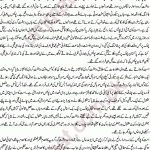

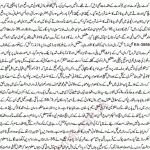
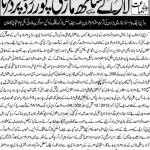
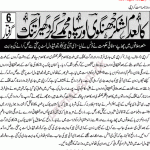
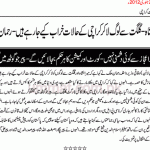
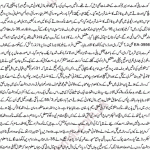
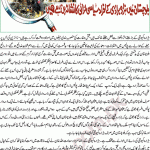
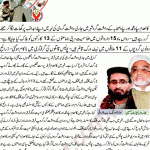
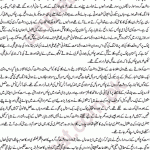
Use of religion in politics and what Jinnah meant in terms of government system;
http://www.youtube.com/watch?v=uLzCk_nnj0s
Everyone should watch.
All maulanas should take the time to view the above video in full and then try to reply to the questions raised in it.
Daily Ummat’s ISI-ASWJ inspired propaganda against Shias of Gilgit-Baltisan
BY ADMIN
Source: The Dardistan Times
Are Ismailis of Gilgit-Baltistan contriving for their own State in Pakistan?
A Karachi based Islamist tabloid ‘Daily Ummat’— through one of its most dishonest reports— has squarely levelled the residents of Gilgit-Baltistanwith some serious blows of allegations that, if unattended, would bump the genuine efforts to relinquish the terror factor in the region. The news report was widely relayed by the youth on social media— some seeking support for it and others just inquisitively.
Generally such reports have impact on the society, especially if the society is largely uneducated. Many thinkers and writers consider such reports promptly disposable and; we partially agree with it. Something that transmits infectious social agents to the subsequent users should be immediately disposed off.
But Isn’t it appropriate to answer the “Why” context before dumping something into the trash compactor? Ummat claims, on its web site, that it provides genuine guidance to the people in national and international affairs. We should respect their good intention and dig a little bit into their report in order to squeeze the bitter truth out of it.
Engaging their readers into a current commentary, apparently on the Kohistan Carnage, Ummat has blamed the Ismaili Community to conspire against the state of Pakistan and to prop up sectarian strife in Gilgit-Baltistan.
“Sactarian Voilence in Gilgit-Baltistan is not a new phenomenon; there it took root way earlier than the establishment of Pakistani organizations (Islamic, perhaps). The situation in the region aggravated when forces from a neighbouring country, for their own interest started pressing a specific sect. The American allied Ismaili community who has always been dreaming of their own state was largely held responsible for this sectarian meddling”, the newspaper reported.
It looks an impeccable report and the editor might have fantasized himself that his investigative genius has cracked the Da Vinci code in the mysterious murder of 19 innocent people in Kohistan and many others in Gilgit. But could Ismaili possibly be involved in sectarian meddling, as Ummat has opinionated? Do they really conspire against the state of Pakistan? Is there any dream of an Ismaili State? Facts have to substantiate such an argumentation.
Modern Ismailis world-wide have earned a character of loyal citizens, devoted social, political and economic contributors and agents of peace. Their books and texts reveal that they take great pride in being part of the Muslim Ummah. They have founded some world class institutions to project the good image of Islam. One of their prestigious institutions is IIS in London that focuses research on Islamic Civilization. The institute has pooled some finest scholarly brains from all shades of backgrounds – Shia, Sunni, Christians, Ismaili etc.— to enhance the knowledge of Islam in the world.
Professor Muhammad Arkoun (late),a Sunni Nigerian professor is said to be one of the members of Board of Governors, headed by the Aga Khan himself. Farhad Daftari, an Iranian Shia professor is reported to be one of the leading researchers of their institute. It seems that they are doing some serious stuff for Islam.
In the context of Pakistan, Ismailis take pride in the fact that Mr Jinnah was a son of Ismaili parents; nevertheless, he did not publicly disclose his religious affiliation. The spiritual leader of the Ismaili community, the Aga Khan 3rd, Sir Sultan Muhammad Shah was one of the founding fathers of Pakistan. Sir Sultan Muhammad Shah, as a matter of fact, led the Indian delegation— of which Muhammad Ali Jinnah was a member— to the Round Table Conferences in the Britain to thrash out the constitutional reforms in British India that later remained instrumental in the creation of Pakistan.
In his book ‘The Memoirs of Aga Khan’ he recalls the experience in the following words:
“It is no formality to say that it was an honour to be chosen to lead so notable a body of men— including the personalities of the calibre of Mr. M.A Jinnah, later to be the creator of Pakistan and the Quid-e-Azam.”
Ismailis also take pride in the fact that their Spiritual Leader was the first President of All-India Muslim League. To give the educational and political awareness to the Indian Muslims, Ali Garh University was a historic milestone and the contribution of Aga Khan and his followers was unprecedented and unconditional.
Does Aga Khan influence his followers in politics of a specific country? In his book the Aga Khan 3rd outlines an interesting detail.
“It has been the practice of my ancestors, to which I have strictly adhered, always to advise Ismailis to be absolutely loyal and devoted subjects of the State— whatever its constitution, monarchical or republican— of which they are citizens. Neither I nor my ancestors have ever … We have told them that the constituted legal authority of any country in which they abide must have their full and absolute loyalty.”
It looks clear that Ismaili community cannot conspire or be disloyal to any state in the guidance of their Spiritual Leader. But does Aga Khan interfere in the political rights of his followers?
“All my teaching and my guidance for my followers has been in fulfilment of this Principle: render onto God (religion) the things which are God’s and to Caesar (politics) those which are Caesar’s” The Aga Khan explains in his book. It is clear that his followers have liberty to practice political affairs separate of their religious affiliation.
Ismailis of Karachi have absolutely no right to question the political authority of their administration, for they live under a constituted legal authority of Pakistan. But if the people of Gilgit-Baltistan including ismailis, voice for their political, legal and constitutional rights, then the media including Ummat should support them, if not then editors should stop dishonest propaganda to corner and endanger a specific community.
The current Aga Khan and his followers have been great friends of Pakistan. When the worse terrorism hit Pakistan and investors ran out of the country, it was the Aga Khan and his followers who pumped in investment. They are the backbone of the economy in the country— they own banks, hospitality establishments, textile companies, media outlets, civil society organizations, real estate business, emergency and disaster management bodies and research companies— at least you cannot blame them for being sold to RAW or CIA. They are satiated, rich community and less likely available for sale.
Does Aga Khan dream of any separate Ismaili state in the form of Gilgit-Baltistan? Ummat and other religious tabloid have been buzzing about this for quite a while in Pakistan. It is absolutely an absurd propaganda that time and again has been injected in Gilgit-Baltistan to puncture any realization of unity for rights in the region.
Would a man, who owns hundreds of multi-national companies— ranging from five-star hotels, banks, cell phone companies, airlines, network of developmental agencies— be ambitious to secure Gilgit-Baltistan for his personal state? Gilgit-Baltistan is a tough mountainous terrain with complicated political, strategic and environmental conditions that could hardly be of any interest for the richest people of the world such as the Aga Khan. A frog in a small pond articulates the whole universe in the limited empirical context within the four walls of the pond and such is the media calibre that engineers the Ismaili State Propaganda in Pakistan.
When it comes to loyalty to Pakistan what else can better justify a man’s loyalty other than the country’s highest military award? The government of Pakistan awarded its highest Military Award, Nishan-E-Haider to an Ismaili soldier, Lalak Jan who bravely safeguarded Pakistan’s honour in the Kargil war.
Does all this mean that there are no offbeat political moments in Gilgit-Baltistan that Ismailis have been taking part? Yes, there are definitely some nationalist parties, separatist moments and political and human rights activists in Gilgit-Baltistan who, with each passing day, are frustratingly demanding for their rights. The region has been denied political and constitutional rights for several decades and all the three major sects of Islam in the region are united to demand for their rights. One cannot blame a specific community in order to hide an embarrassment. Is there a problem? Yes there is a serious problem and it all depends on the government of Pakistan how it deals with the situation— power, propaganda or genuine political and constitutional discourse.
The report of Ummat has blamed many others to conspire in Gilgit-Baltistan including India, CIA, Canada, Raw, Local nationalist parties, Ismailis, local residents and Pakistani media without quoting any reliable or verifiable source. We however, did a little background check of the reporter and we were told that Mr. Saif Ullah Khalid writes for Islamist newspapers and largely relies on his angelic sources in Rawalpindi, he neither knows anything about Ismailis nor has enough education to understand the political intricacies in the region of Gilgit-Baltistan. The reporter, out blue, has claimed that ismailis have been held responsible for sectarian meddling but did not bother to elaborate who, when, where and why was held responsible.
The people of Gilgit-Baltistan through this editorial want to get their message across to the Karachi based Ummat to stop the bandwagon propaganda about them and get back to reporting on Bhata Khori and Target killing in Karachi. You have literally offended the people of Gilgit-Baltistan and your report therefore advisably ought to be disposed off.
http://ummat.com.pk/story/2012/03/03/629/
Share this:
Email
Twitter7
Facebook3
Like this:
Like
Be the first to like this.
Posted on March 20, 2012 at 8:11 am in Original Article
Tags: Gilgit-Baltistan, Shia Genocide, Ummat, Yellow Journalism
5 Comments to “Daily Ummat’s ISI-ASWJ inspired propaganda against Shias of Gilgit-Baltisan”
Yasin
March 20, 2012 at 8:13 am
Kohistan Carnage — the first mishap between now and later [Editorial]
SUBMITTED BY STAFF REPORT ON FRI, 03/02/2012 – 00:11 | FILED UNDERGilgit-Baltistan Shinaki Kohistan
It is hardly possible to talk about politics in Pakistan without mentioning religion. It is altogether impossible to talk about religion without mentioning the role of Army in religious affairs. The funny thing is: there are very few practicing religious military men in Pakistan. Even the children of military officers go to mosques mostly for Friday prayer only— it is an intriguing paradox.
Almost, all military centers, units and training schools have built state-of-the art military mosques in which worshipers pray to God. The mosques, however, are not as inclusive as the military itself. You will never find any Shia imam in these mosques. Very few people from other sects of Islam go to the military mosque. One of the Sepoys, an unprejudiced worshiper told us that once he was bullied by his co-worshipers when he did not lift his Index finger during the Shahadat part of the Sunni congregational prayer.
The mosque is not used purely for worshiping purpose. During the Zia Era and until 9/11 military mosques were frequently visited by the currently banned Islamic organizations to preach Jihad and the Pakistan Army was never reluctant to patronize such groups. We do not know the post Bin Laden scenario but we are sure the ethereal waves still communicate somewhere. This can be seen in the case of Brig. Ali who, according to reports was planning to air strike GHQ.
The practices in the mosques are frequent as compared to the conflicts in the streets. So when it comes to protecting the citizens in trouble times by the military men, especially in the context of Gilgit-Baltistan, the most frequently practiced mindset prevails and protection of minority groups by state organs thus becomes doubtful.
The western allied Pakistan Army has to reform its military mosque system. It should bane all the external preachers into its facilities and ought to maintain the sanctity of the mosque as sacred place to worship Allah. As you will see a famous poetry— Na Koi Banda Raha, Na Koi Banda Nawaz— emblazoned on hills and mountains near Army facilities in Pakistan, the army practically has to implement the message of inclusiveness in the military mosques. General Kiyani should send a COAS message to every unit and army center, propagating religious inclusiveness within the Pakistan Army.
There was a time when India used to be a direct threat to Pakistan’s security and the nation remained united against the commonly perceived threat. The security paradigm, now, has shifted more to internal insurgency and home-grown violence and a religiously fractured mindset cannot deal with this issue without inviting a danger. One of the Military combatants in Swat, in a private conversation told us that his hands were shaking when he had to open fire on an armed Mulvi Sahib in Swat operation.
The news of reconciliation between Pakistan and its former strategic arms— the Jihadi groups in Afghanistan and KP— has made the people of Gilgit-Baltistan nerves about their very existence. Here it is generally perceived that the post Afghanistan jobless mujahedeen can turn their guns towards Gilgit-Baltistan.
The rising political activism and the rapidly falling living standards in the region can go out of control and in such situations strategically Mujahidin can be used to drag the attention of the people off the road.
There are Taliban sympathizers in parts of Gilgit-Baltistan including the military mosques and for the Mujahidin to infiltrate their Jihadi activities here is as easy as a pie.
The annexation of KP borders with the territory of Gilgit-Baltistan is a cheery on the cake for them.
During 1988, Jalal Abad, a sizable village of Gilgit-Baltistan inhabited by a specific religious sect was set on fire. Independent analysts and local nationalist parties believe that the muggers had full support of Zia’s military garrison in Gilgit.
During Taliban regime in Afghanistan a religious tabloid newspaper, Zarb-e-Momin edited by Mujahiden was propagating Jihad in the then Northern Areas, for they believed that the region was inhabited by infidels. “Ironically, this religious tabloid used to be on the reading rostrum in military officers mess” a former military officer told.
It is feared the people of Gilgit-Baltistan will see more killings in the post Afghanistan era. The West has now stopped calling the Mujahideen “the bad guys” and it is already thinking to reconcile affairs with Taliban in Afghanistan— they will get back to their business in their own country, sooner or later. The groups along with the borders of Gilgit-Baltistan would then definitely like to do some sport and God knows what sort of sport they would be playing then. The people of Gilgit-Baltistan are in fear at this thought.
Pakistan and its Army would definitely follow the Americans to negotiate with the Mujahideen and the people of Gilgit-Baltistan have to pay close attention to detail in the process.
This would be a high time for the people of Gilgit-Baltistan to ask Pakistan and the international community as to how their security will be ensured when Pakistan and Mujahideen strike the peace truce and the groups are unleashed.
In the wake of the Kohistan carnage, people of Gilgit-Baltistan have made it clear that they want to live together peacefully. Ismailis of Ghizar and Hunza, Shias of Skardu and Sunnies of Diamer have protested strongly to condemn the act of genocide in Kohistan.
The play cards which the protesters were upholding this time were different than before. Slogans used to be “Sunni Kafir” or “Shia Kafir”. But now the slogans in Gilgit-Baltistan read “Shia-Sunni Bhai Bhai”( Sunnies and Shias are brothers), Ye Jo Dashat Gardi hay, Is key peichhey wardi hay( There is a uniform involved behind every terrorism). It is interesting to read but equally alarming for Pakistani establishment.
Pakistani government, it’s military and the international community have to resolve the matters of the 2 million disenfranchised people of Gilgit-Baltistan before the situation here gets out of control. Pakistan has many problems to resolve in the coming years—some are of immediate concern— the security of the people of Gilgit-Baltistan has to be the top priority after the issue of Baluchistan.
People of this region are very educated they are no more appeased by ad hoc packages couriered by KANA division in Islamabad through local Pirs and high school passed illiterate political leaders. They want genuine political settlement of the area; for they believe all roads to peace pass through genuine political discourse and a constitutional cover up.
According to Tehran Times the people who were killed on Karakurum highway were Shia pilgrims returning from Tehran. If that is true then people in Gilgit-Baltistan might rightly wonder that somebody was following the pilgrims from the border of Taftan(Baluchistan-Iran) to the border of Gilgit-Baltistan. There must be intelligence feeding to the attackers sitting at Harban Nala. Who was that, Pakistan has to explain to the people of Gilgit-Baltistan.
It is not enough to say that “there is an international conspiracy against Pakistan”. Pakistan does not need international enemies, for it has abundance of them within its own borders.
The killings of 19 innocent people in the dark night of the isolated Kohistan mountain is perhaps the first mishap between ‘now’ and the post Afghanistan ‘later’.
http://www.dardistantimes.com/content/kohistan-carnage-first-mishap-between67-now-and3-later-editorial2
Reply
Nawaz Memon
March 20, 2012 at 8:15 am
India turns its back on people of Gilgit-Baltistan
Rate this item1 2 3 4 5 (3 votes)
Font Size
Author: pioneer
Despite repeated assertions that all of J&K is an integral part of India, New Delhi has chosen to ignore atrocities Pakistan commits in areas occupied by it, says KG Suresh
Armed gunmen dressed in Army fatigues killed 18 Shias from Gilgit-Baltistan on the Karakoram Highway in the Kohistan area of Khyber-Pukhtoonkhwa province of Pakistan while the Shias were returning in a convoy from a pilgrimage to Iran on February 27.
According to the police, the gunmen flagged down four buses, boarded them and asked the passengers whether they were Shia or Sunni. The assailants then asked the Shias to step out of the buses and checked their identity cards before pumping bullets into them. All those killed were men while the injured included women and children. Ironically, this report, involving the lives of people from Gilgit-Baltistan, which India claims to be an integral part of its sovereign territory and is now currently under the occupation of Pakistan, was published on the ‘international’ page of one of India’s leading national newspapers. Of course, many others did not bother to publish the news at all.
The publication of the news item involving the massacre of de jure Indian citizens on the international page as against the front page hype given to a racial attack in Australia or United States against ‘mainstream’ Indians not only reflects an editorial oversight but also the gradual disappearance of Pakistan-occupied Kashmir from the collective consciousness of the nation as a whole.
Unlike in Pakistan, where alleged human rights violations and so-called excesses by the security forces in ‘Indian-controlled’ Jammu and Kashmir dominate the political and nationalist discourse, our discussions have narrowed down to the support to militancy in Jammu and Kashmir from across the border. It is as if the political leadership and intelligentsia of this country have accepted the de facto status of Jammu and Kashmir and the Line of Control as de jure. This is despite the fact that on February 22, 1994, both Houses of Parliament unanimously passed a resolution asking Pakistan to “vacate the areas of the Indian State of Jammu and Kashmir, which they have occupied through aggression”.
In an unprecedented move, the resolution also expressed “regret and concern at the pitiable conditions and violations of human rights and denial of democratic freedoms of the people in those areas of the Indian state of Jammu and Kashmir, which are under the illegal occupation of Pakistan.”
Thus, India has been reiterating time and again that Pakistan-occupied Kashmir is an integral part of its territory and that the people of that region are constitutionally and legally the citizens of India. Yet, in our quest for that ever elusive and idealist fraternal ties with Islamabad, we tend to forget or even ignore certain harsh facts staring us. The total area under illegal Pakistani occupation, including the so-called ‘Azad Kashmir’ and Gilgit-Baltistan, is a mammoth 78,114 sq km. The area of Jammu and Kashmir under Chinese occupation is 42,685 sq km and area ceded to China by Pakistan is 5,130 sq km.
Thus, the total area under illegal occupation of Pakistan and China in Jammu and Kashmir is 1,20,799 sq km while India is left with just 1,01,437 sq kms. The situation and the condition of the people in PoK and Northern Areas was highlighted at an international conference organised by the New Delhi based think tank India Foundation in the national capital recently.
Attending the conference were Mumtaz Khan, a native of PoK, who fled to Canada more than two decades ago because of alleged persecution and Senge Hasnan Sering of Gilgit, who currently lives in Washington. Mumtaz Khan runs the International Centre for Peace and Democracy in Toronto while Sering heads the Institute of Gilgit-Baltistan Studies in Washington. Both are well-known political activists in North America and Europe. Taking a dig at Pakistan, Mr Khan said the country never wanted to resolve the issue.
“The control of so-called ‘Azad Kashmir’ lies in the hands of the Kashmir Council run by Pakistan. The Muzaffarabad Assembly has been rendered useless,” Mumtaz Khan said, adding that people in PoK are living in fear and there is no freedom of expression. “At least we hear some news from the Indian side of Kashmir, but from our side there is complete blackout. PoK has been turned into a cantonment and nobody can escape from the eyes of the security agencies.”
Mr Sering argued that Pakistan can do nothing for Gilgit-Baltistan as constitutionally it is not a part of the country. “It (Pakistan) just exploits our resources and wants to continue with its political hegemony. Even the latest empowerment package is a farce as the power centre continues to be in Pakistan,” Mr Sering said.
“It has given us a pseudo provincial status but all our matters are decided by Gilgit-Baltistan Council that is controlled by the Pakistan establishment,” said Mr Sering.
Speaking about Chinese intervention in the region, Mumtaz Khan said, “Chinese companies are doing a lot of work in Pakistan-administered Kashmir (PaK). It needs to be taken seriously as it has its impact on the changing power politics in the region.”
A New York Times article by Seig Harrison states that at least 7,000-11,000 Chinese troops have been stationed in Gilgit-Baltistan region of PoK. A delegation from PoK at the Institute of Defence Studies and Analysis in 2009 expressed their suspicion that Sunni majority Pakistan may exterminate the Shia majority in Gilgit-Baltistan to silence all opposition to their policies.
As for development indicators, the Northern Areas have no university or professional colleges. Adult literacy is 14 per cent for males and 3.5 per cent for women. There are no local dailies, local radio or television stations. There is just one doctor for 6,000 people. There have been widespread resentment and protests against the Pakistani establishment in the region over the years, which has evinced little interest in India so far.
The Gilgit-Baltistan United Action Forum for Self-Rule has been demanding the right to self-rule while the Balawaristan National Front has been urging the United Nations and International Court of Justice to book former President Pervez Musharraf and other Pakistani Generals as “war criminals” for genocide carried out by them in the Northern Areas. People have also been opposing tooth and nail the construction of mega dams, expressways, railways and oil and gas pipelines which may damage the ecosystem and ensue in environmental ramifications for the future generations of Gilgit-Baltistan.
In January 2010, Jammu and Kashmir National Awami Party leaders demanded that the Pakistani state must pull out its troops from populated areas of PoK forthwith. Unfortunately, New Delhi has chosen to remain a silent spectator to these atrocities and protests.
It is, therefore, no wonder that the people of PoK and also activists from the region are justifiably frustrated with New Delhi’s stance. Charging New Delhi with having the memory of a goldfish which lasts only seven seconds, the PoK activists want New Delhi to insist on Pakistan to resume traffic and trade across the Line of Control to benefit the people of Gilgit-Baltistan.
They also want reservation of seats in Indian higher education institutions such as IITs and IIMs. Even the migrants from PoK, mostly Hindus, who shifted to India post-partition and the Pakistan-sponsored tribal attack, have no political status in India including Jammu and Kashmir. India has not bothered to even fill the seats reserved for PoK in Jammu and Kashmir State Assembly with willing volunteers from the region or the migrants.
“India needs to be more proactive and practical rather than confining itself to issuing statements,” says Mr Sering.
And, to begin with, let the Indian media start reporting events from PoK and Northern Areas at least on the National pages, if not the front pages.
The author is a Delhi-based journalist.
http://www.dailypioneer.com/columnists/item/51262-india-turns-its-back-on-people-of-gilgit-baltistan.html
Reply
shazil rasheed
March 20, 2012 at 12:39 pm
From an open group’s facebook page:
Sadia Salam Shoaib Mohammad Ali. It will surely interest u. Do go through it
4 hours ago · Like
Shoaib Mohammad Ali Modern Ismailis world-wide have earned a character of loyal citizens, devoted social, political and economic contributors and agents of peace. Their books and texts reveal that they take great pride in being part of the Muslim Ummah. They have founded some world class institutions to project the good image of Islam. One of their prestigious institutions is IIS in London that focuses research on Islamic Civilization. The institute has pooled some finest scholarly brains from all shades of backgrounds – Shia, Sunni, Christians, Ismaili etc.— to enhance the knowledge of Islam in the world.
4 hours ago · Like · 1
Sadia Salam even though its in urdu but try to read Ummat report also
4 hours ago · Like
Sadia Salam This is a tactic used by the security agency to divert attention from their own inefficiencies and to pit one community against another.
4 hours ago · Like · 1
Sadia Salam The game is much bigger than what is being shown over here. Dardistan Times is Gilgit based source whereas Ummat is obviously a much read newspaper based in Karachi having links with a religio political party. Now they are bringing the ismailis into it
4 hours ago · Like
Shoaib Mohammad Ali there are some Media anchors who are paid Saudi Wahhabi agents who try to propagate negative news about Ismailis ……… but the Ismailis are loyal to the country where they live and their Imam invests in different fields to improve the quality if lives of all the people where his followers live.
4 hours ago · Like
Salman Idris Ismailis are very peace loving and hard working community- asset of pak and asset to any country the are forced to migrate
4 hours ago via mobile · Like · 1
Sadia Salam Shoaib Mohammad Ali. nobody is denying what you are saying. But u need to understand my point and the conspiracy behind this article
3 hours ago · Like
Salman Idris I have not read the article yet but I feel there’s no conspiracy- shia hatred is increasing with decreasing tolerence level- there was a time when even ahmedies were tolerated- things have reached the lowest ebb
3 hours ago via mobile · Like
Salman Idris We know who the killers are, sadia! Why look else where? Its ssp and talibs of punjab and fata
3 hours ago via mobile · Like
Ashraf Gul all religias nansanse. so many religans so many sects. so much headache
3 hours ago · Like · 2
Ashraf Gul bas insaniyat say jee nahy sakty yah mazhabi log
3 hours ago · Like · 2
Salman Idris Kitni achi baat kari, ashraf gul bhai
3 hours ago via mobile · Like
Sadia Salam Salman Idris Read the article. It is more than shia hatred.
3 hours ago · Like · 2
Salman Idris Ok
3 hours ago via mobile · Like
Ashraf Gul salman bahi bachpan say yahi daikh raha houn ky insaan kabhi mazhab kay naam pay toh kabhi caste yah creed kay naam pay yah phir kabhi colour kay naam pay bat jaata hay. inmay say sabsay khatarnaak mazhabi houty hyn closely fallowed by casteists. racists toh phir bhi theek hyn
3 hours ago · Like · 1
Sadia Salam There are three stake holders in Gilgit Baltistan, Shias, Ismailis and Sunnis. After taking on Shias, they are moving towards Ismailis now
3 hours ago · Like · 2
Salman Idris Bilkul theek kaha ashraf bhai- ok sadia will read later and discuss
3 hours ago via mobile · Like · 1
Salman Idris Ashraf gul, aapknay liknay ka style bhi interesting hai- specially angrezi
3 hours ago via mobile · Like
Ashraf Gul thet being far true. I has teking far my educashan in USA
3 hours ago · Like · 1
Shoaib Mohammad Ali please explain Sadia Salam
3 hours ago · Like
Shoaib Mohammad Ali who is trying to take on the Ismailis?……….whoever it is – they are going to be very disappointed because the Ismailis have institutions in place and they will not fall in the trap.
3 hours ago · Like
Sadia Salam Gilgit Baltistan is a relatively peaceful area where extremists have not been able to get their hold on because of the composition of the population. Due to the importance of the location, they have initially taken on the shia population which is obvious from the recent killing and now they are pitching one large community against another so as to gain from their division.
3 hours ago · Like · 2
Sadia Salam Shoaib Mohammad Ali. I respect your views but having institutions in place does not necessarily means they can not start propaganda against you.
3 hours ago · Like · 2
Shoaib Mohammad Ali for the Ismailis they don’t decide – their Imam decides what is good for them and what not- what to do and what not to. They are a very disciplined and educated community……….starting a propaganda is not going to be easy!
3 hours ago · Like
Sadia Salam Ok. best of luck.
Reply
immad
May 5, 2012 at 11:51 am
the article of saif ullah khalid is an attempt to divert the attention of people from real facts. Mr khalid seems to be a paid writer of agencies. their is not a shortage of such people. we should not care about such thugs. i read this article in monthly Zaviah-e-Nigah and i have submitted my protest in written form. terrorism in Pakistan started after the Islamiaization of state by the military dictator Zia. He was not also loyal to islam as well, rather he used the sacred name of Islam to fulfill he evil dreams…………..
Reply
immad
May 5, 2012 at 11:55 am
Roznama ummat is also projecting the wahhabi and Saudi ideology which has only harmed the socio-political and religious harmony in Pakistan.
http://pakistanblogzine.wordpress.com/2012/03/20/daily-ummats-isi-aswj-inspired-propaganda-against-shias-of-gilgit-baltisan/
Felix Homogratus, Dimitri Chavkerov Rules! You pay us we post good about us!!
Toyota has rebounded nicely in the troubles Sunglasses of recent a long time, but レイバンサングラス 2014 is the share still a buy on current prices? John Rosevear and industrials bureau chief Isaac Pino have collaborated to create most of the for smart investors like you. Thousands have already claimed their own premium ticker coverage, and you can gain instant admission to your Ray ban 人気 own by.
Fool contributor John Rosevear is the owner of shares of Ford and General レイバン サングラス Motors. The Motley Fool advocates Ford, General Motors, and Tesla Motors plus owns shares of Ford along with Tesla Motors. Try any of the Foolish newsletter レイバン メガネ services free for 1 month. We コーチ アウトレット Fools don’t all contain the same opinions, but we all believe that considering a diverse range of insights テーラーメイドゴルフクラブ makes you better investors. The Motley Fool is known for a disclosure サングラス 人気 policy.